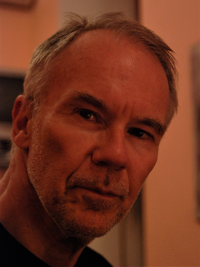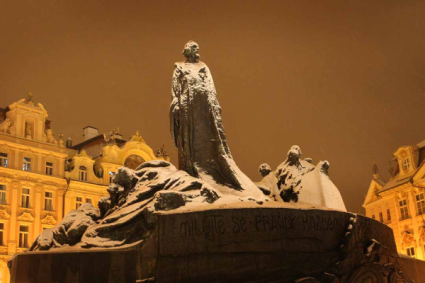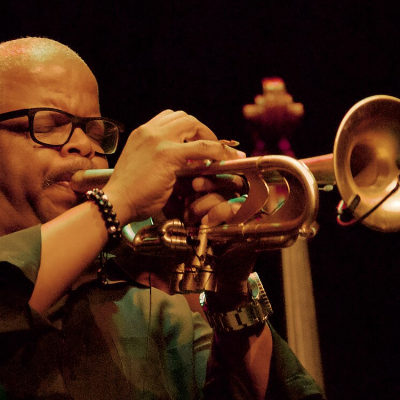.
.
“Christmas, Stockings” a story by Peter Newall, was a short-listed entry in our recently concluded 56th Short Fiction Contest. It is published with the permission of the author.
.
.
.
“Prague: Snow at Night,” by Steve Evans
.
.
Christmas, Stockings
by Peter Newall
.
…..Prague, Christmas Eve, 1994. Midwinter. Snow. Anna and I have a room in the Grand Hotel Europa, which is not grand in the least but run-down and cramped, still bearing the stamp of its Warsaw Pact years. The floral wallpaper is worn and the carpet threadbare; the room is mostly taken up with the big double bed.
…..Anna is sitting in the middle of the green chintz coverlet, hugging her crossed legs, looking sulky. She is wearing a dark roll-neck sweater and a rope of imitation pearls, her rich brown hair is piled up on top of her head, but everything in the picture is secondary to her bright red woolen stockings. It could be a painting by Beckmann or Kirchner, Woman in Red Stockings, Anna’s folded legs a big vermillion X in the centre of the canvas, their curves heavily outlined in black, her face a pale splash with a hard straight mouth, and the rest of the scene – the bathroom door, the wall, the wardrobe – rough rectangles of indeterminate colour.
….. It’s time to go, if I want to catch the gig at the jazz club, so I am pulling on my overcoat. As I do, Anna is telling me she doesn’t want to go out, it’s freezing cold, she’s only just thawed out from the train trip, and she is absolutely not going to any jazz club. But she doesn’t want to sit in this crummy hotel room on her own either; she didn’t give up going to Morocco with her friends and come to Prague with me to be left alone, why can’t I stay with her, we just got here, she’s tired, we haven’t been in a proper bed for two days. And it’s Christmas Eve.
….. I’m half-tired too, it will take a physical effort to go outside into the winter night, and it’s tempting just to stay with Anna in the big saggy bed, but I tell her I didn’t come to Prague to sit in hotel rooms, I want to hear some music, and I’m going out. I don’t catch exactly what she says in reply; she has turned away to light a cigarette.
….. I close the padded hotel room door and jog down the carpeted stairs, doing up my coat, winding on my scarf, pulling on my gloves against the sharp cold waiting for me outside. I slip through the heavy green baize curtains and push open one of the tall double doors, to emerge onto the street.
….. Half past seven. It was already dark at four o’clock, and the night has become a lot colder and darker in the hours since then. The snow lying in Wenceslas Square is not deep and crisp and even but grey, frozen hard and treacherously slippery. Round the corner in Krakovska Street, though, it is soft and thick, covering the whole road but for two wet black wheel-ruts, piled up on the window ledges of the lightless, sooty buildings. I can only see my way because of the white snow; there are no streetlamps. Big blurry mounds mark where cars are parked, drawn half up on the pavement.
….. Walking is hard work. I plough on, my feet already wet through my English boots, but I see no sign of life at all, let alone a jazz club. The street is deserted. I am just deciding that I have the address wrong, or the gig has been cancelled, and I can go back to the hotel and Anna, when I see on the next block a faint glow reflected on the snow. I flounder towards it; above a narrow door hangs a yellow and black lightbox sign, Jazz Club Agharta.
….. Wet, narrow stone stairs lead down to a pool of light and warmth. A rack crammed with fat, heavy coats, scarves and hats stuffed half into in their pockets, steams like a laundry. My glasses fog up as I push my own coat into the press. I stoop through a low arch into a barrel-vaulted cellar. Brick walls, pillars, heavy dark wooden tables. Perhaps it was once a monks’ refectory. A dozen people sitting around in scattered ones and twos.
….. On the small stage, vibes, double bass and drums are set up. The musicians are just going on. The vibes player – tall, sharp-nosed, goatee and moustache – seems to be the leader. A short, dark fellow nurses his alto sax, unpolished, dimly lustrous like a Versailles mirror. The bassist is as anonymous as every other bassist. The drummer rattles his snare, thumps his bass pedal, tightens the wingnut on his ride cymbal. A bit of talk between the four of them, inquiry, raised eyebrows, shrugged shoulders, a decision; they open with Green Dolphin Street, feeling their way.
….. At the bar I order dark beer from a girl whose coppery hair is tied back with a black velvet ribbon. I take a seat against one wall. The tables begin to fill up around me, and cigarette smoke thickens under the low ceiling.
….. A minor blues, not bad, then they swing into My Funny Valentine, the vibes blocking out the opening chords then taking the first solo, building it up, a series of runs like diamonds spilling off a broken string, each so dazzling that you forget the one before it. Nobody in the crowd is talking, just watching, listening, intent. The band are working Miles Davis’ book; they do So What, the double bass making the most of his moment, and If I Were a Bell. By now they’re good. The alto player tears off a ragged, stuttering solo in Milestones. The drummer doubles the time, the others go with him, and the whole thing boils over before resolving into the riff. We clap and cheer, and I realise that only fifty people are here, listening to this music on this Christmas Eve. But there’s a feeling in the room, an unspoken agreement, that it is something special.
….. They do All Blues, lovely, drawn-out, hypnotic, and that’s the end of the set. The vibes player straightens up, putting down his mallets. They look at each other, nodding, a look that says, ‘it’s working tonight, a pick-up gig, just standards, but it’s working, we’re catching the trapeze, it’s good.’
….. I look at my watch. Twenty to ten. Still early. If I leave now it’ll probably be all right, Anna will be pleased I made the sacrifice to come back, we’ll go to bed, it will be fine. But my head is still full of their playing. The second set is always better than the first, and this is a one-off, there’s no coming back tomorrow night. I came all this way to Prague, rattling along for ten hours in a cold, sooty train from Berlin, precisely for this, jazz in a snowbound cellar in the middle of Central Europe. Live, once in a lifetime music, never to be heard exactly like this again. You either hear it, or you don’t. Not to hear it is too much of a loss for me to bear.
….. I think of how Anna will be when I finally get back, and wince. But the few arguments we’ve had in the two weeks since we got together have all blown over. It looks like we might get on well. I was a bit drunk when I asked her to come to Prague with me, but I’m happy that she’s here. We have quite a bit in common, we’re compatible in bed, and we laugh a lot together, a good sign. As recently as midday yesterday we were laughing, walking arm in arm in the Spreepark in Berlin, frozen breath in the cold air, big coats buttoned up, her green scarf, her red wool stockings, her black boots, the blue sky, the sparkling white snow. I do like those red wool stockings, they suit her, they give her the aspect of a big predatory cat. But for now, I go to the bar and buy another half litre of dark, bitter beer.
….. In the second set, the altoist gets stronger. They all take more risks. The solos weave in with the smoke and curl around under the curved ceiling, unfolding like fast-growing vines. As they play on, the long tables become forested with brown bottles, the ashtrays fill up, but still none of us speak. They work through a couple more standards, we don’t even care what they are, swinging in four, the bass player, face expressionless, digging in hard. The vibes and alto overlap in eagerness, jumping off each other. They build a castle in forty-eight bars, a breathtaking invisible Prague Castle in the air, then jump off the top into space, clouds, a snowstorm. The place is spellbound. They are charging along, they wrap up the tune – is it Giant Steps? – as tight as a spring, so it ends on one big chord, resonating in the warm, smoky air. Then they walk off. There’s no fuss, there’s no thank you and goodnight, the lights don’t even come up, they’ve just finished. There’s some ragged applause, but it doesn’t fill the huge gaps in the air where the music has been.
….. Pulling on my coat in the lobby, I see the vibes player. I grin at him; he grins at me. We don’t have any common language. I notice his hands, square, freckled, workmanlike, nothing unusual about them. Impossible to imagine they called up all those glittering runs, flickering like blue flames in the Powder Tower. He tugs a dark blue beanie over his ears and we all clump up the steep steps into the night.
….. Outside, bulky in coat, overcoat, scarf, gloves and hat, I walk stiffly, like the Golem, back along Krakovska. More snow has fallen, a lot more; it must have been falling all the while I was underground. Maybe I was down there for days, or years, bound by some old Prague alchemist’s spell.
….. But now the sky has blown completely clear. Heaven sits over Prague like a huge bottomless bowl. It’s black, not blue or purple like most cities at night. The stars are very big and white and clear. It’s like a woodcut I saw, sold as a tourist postcard, showing Franz Kafka walking along one of these overhung streets at night, with snowflakes and shooting stars mingling above his head, brilliant white flashes in the inky blackness.
….. Everything normal is reversed; the sky is dark, the ground is pale. The street is muffled, silent; I can barely hear the ‘push, push’ sound of my footsteps in the snow. But I can hear the rippling vibe lines of So What ringing in my head.
….. I’m too happy to go back to the hotel just now. I want to breathe this air, see these stars, listen to this silence. I walk past the statue, the bronze horseman, black and white, metal and snow, against the dark sky, and on down toward the railway station. Climbing over a frozen metal railing I step into a knee-deep snowdrift, and flounder through it back to the footpath. My legs are wet. I don’t care. The whole square is mine, frozen air, bare trees, domed buildings, the stars. And under the heaped-up snow lie the narrow uneven streets, the crooked buildings, the clocks and the leaning gravestones that make up this city, and below them lie sewers, tunnels, mines, all leading down to goblin halls. I walk and walk, dizzy with happiness, dizzy with Prague.
….. I have no idea what time it is when I emerge from a side street onto Wenceslas Square, outside our hotel. As I plod up the carpeted stairs, suddenly tired, I try to think what to say to Anna. Perhaps she will be asleep, and I can put off the explanations till morning. I try to prevent the big wooden stick on the keyring clattering as I turn the lock. I push the door open slowly, experimentally. The light is still on. All right, there are going to be recriminations. Bracing myself I step into the room. The bed is empty, still made, with a U-shaped dent in the green cover where Anna was sitting when I left. She’s not in the bedroom. Two paces to the bathroom door, click the light on, empty. I pull open the wardrobe door; her coat is not there, nor is her bag.
….. I feel like I’m in an old film. A simple plot, teaching a simple lesson; you leave your girl alone for something you think you want more, doesn’t matter what, jazz, a bar, a hunting trip, another girl, and when you get back she’s gone. Maybe she’s simply moved to another room to make her point? I hurry back downstairs to the front desk.
….. The night porter is sitting at his desk, reading a newspaper, smoking. From his seamed, baggy face he is always smoking; it goes with the job, I suppose. But as I begin he shakes his head. He doesn’t speak English. I don’t speak Czech. How to explain? I can’t even remember how to say my room number, so I show him the wooden keyring, 802. I point upstairs and pantomime inquiry. He says something I don’t understand, then repeats it, nodding, making a little sweeping gesture with his hand toward the front door. Very well; Anna has gone. It is just like the old romance movies; transgression and consequences, cause and effect.
….. Then it strikes me that, just as in those old films, she will have left a message, a slip of folded paper in the dark wooden pigeonhole. Women can never resist having the last word: ‘You are too selfish. Don’t bother looking for me. Thanks for messing up my holiday.’ Maybe not pleasant reading, but something, an explanation, a rounding-off, a conclusion to the affair.
….. I crane round the night porter’s shoulder and look for my number amongst the pigeonholes. He understands and points to a space above tiny gold numbers; it’s empty, just a wooden rectangle full of air. To make the point he slides his stubby hand into it, brings it back out and spreads his fingers, palm up, to show me. Nothing.
….. And that’s it. I’ve swapped a two-set gig on a winter night at the Agharta jazz club, Prague, for a nice, funny, dark-eyed girl in bright red woolen stockings. Tomorrow, no, it must already be today, is Christmas Day. I don’t know what I will think about all this when I wake up, but now, as I slowly climb the stairs again, my boots wet through and my legs suddenly so tired they feel hollow, I tell myself it was worth it, the music and the night were so magical that no matter what, it was worth it.
.
.
___
.
.

Peter Newall was born in Sydney, Australia, where he played bass in various unremarkable groups while working as a roadmender, in a naval dockyard and as a lawyer, but has also lived in Kyoto, Japan, where he sang for a popular local blues band, and now in Odessa, Ukraine. He has been published in England, Hong Kong, the USA and Australia.
.
.
Listen to a 1961 recording of the Oscar Peterson Trio with Milt Jackson playing “On Green Dolphin Street”
.
.
___
.
.
Click here for details on how to enter your story in the Jerry Jazz Musician Short Fiction Contest
.
Click here to read “Celestial Vagabonds” by Max Talley, the winner of the 56th Jerry Jazz Musician Short Fiction Contest
.
.
.



































